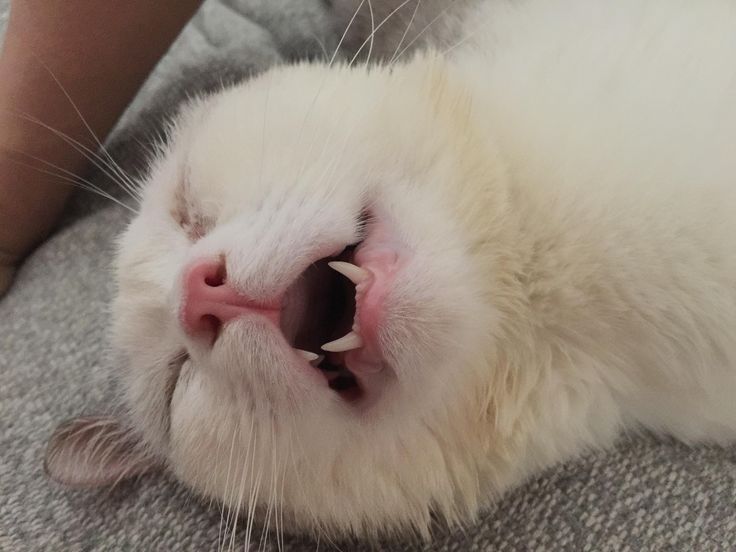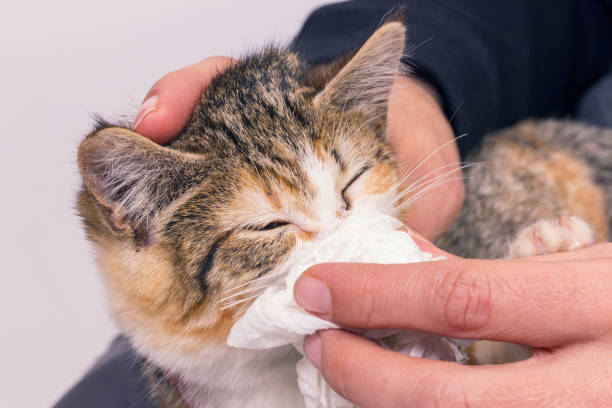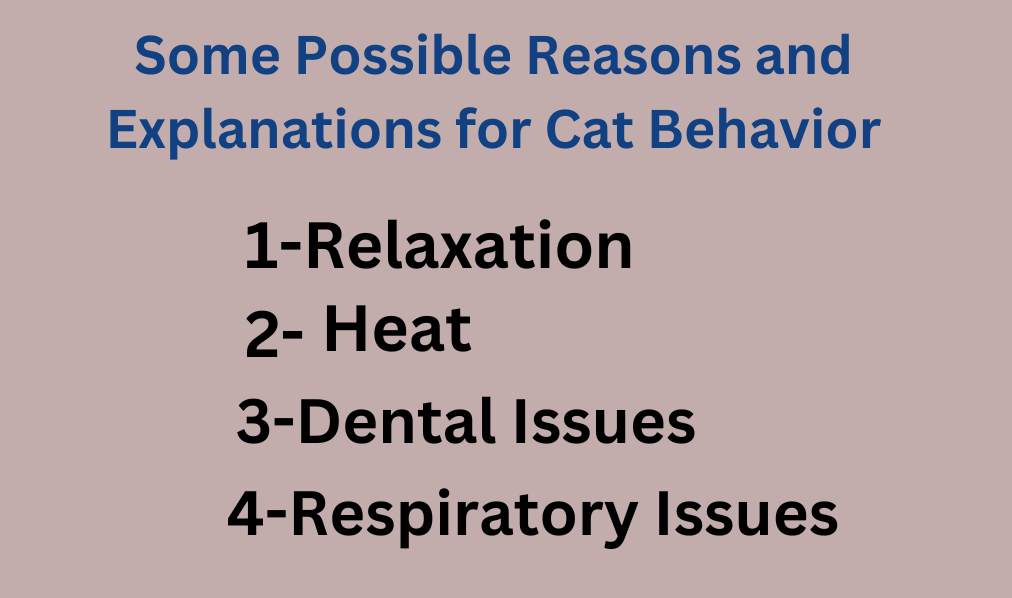Did you know that cats sleep for an average of 15 hours a day, and some can even sleep up to 20 hours? That’s more than any other mammal on Earth! Cats are fascinating creatures, and their sleeping habits are no exception. But what does it mean when a cat sleeps with mouth open? Is it normal or a cause for concern? We will explain the possible reasons and health implications of a cat sleeping with mouth open.
They can sleep in various positions, such as curled up, stretched out, on their back, or on their side. Each position has a different meaning and reflects the cat’s mood, personality, and comfort level.
A Relaxed Cat Sleeping with Mouth Open
One of the most common and harmless reasons why a cat sleeps with mouth open is that it is simply a cat relaxed and comfortable. When a cat is in a deep sleep, it may relax its jaw muscles and let its mouth fall open slightly.
This does not mean that the cat is having trouble breathing or feeling stressed. On the contrary, it means that the cat feels safe and secure in its environment and trusts you as its owner. Some cats may also show other signs of relaxation, such as snoring, drooling, or dreaming.
You may notice your cat twitching its ears, whiskers, or paws, or making soft noises while sleeping. These are normal and healthy behaviors that indicate that your cat is having a good rest.
“Sleeping with their mouths open is just another way our cats show us how comfortable they are around us”. Therefore, if you see your cat sleeping with its mouth open, you can be happy that your cat is feeling cozy and content.
A Cat With a Cold is Another Reason for a cat sleeping with mouth
Another reason why my cat is sleeping with its mouth open is that it has a cold or a respiratory infection. Just like humans, cats can catch viruses or bacteria that affect their nose, throat, and lungs. When a cat has a cold, it may have difficulty breathing through its nose and may resort to breathing through its mouth.
This can cause the cat to sleep with its mouth open, especially if it has nasal congestion or discharge. A cat with a cold may also have other symptoms, such as sneezing, coughing, watery eyes, fever, or lethargy. These symptoms can vary in severity and duration, depending on the type and cause of the infection.
Cat colds are usually caused by two common viruses: feline herpesvirus and feline calicivirus. These viruses are highly contagious and can spread through direct or indirect contact with infected cats. Cat colds can also be caused by bacteria, such as Chlamydia or Bordetella, which can complicate the viral infection or occur independently.
Cat colds are usually treated with supportive care, such as keeping the cat hydrated, warm, and comfortable, and cleaning its eyes and nose. In some cases, antibiotics or antiviral medications may be prescribed by a veterinarian. Therefore, if you notice your cat sleeping with its mouth open and showing signs of a cold, you should consult your vet for diagnosis and treatment.
A Cat With Allergies or Asthma
A third reason why a cat’s mouth opens while sleeping is that it has allergies or asthma, which are chronic inflammatory conditions of the airways. When a cat has allergies or asthma, it may experience difficulty breathing, wheezing, coughing, or sneezing.
These symptoms can worsen when the cat is exposed to certain triggers, such as pollen, dust, smoke, perfume, or cleaning products. These triggers can cause the cat’s immune system to overreact and produce inflammation and mucus in the airways.
This can make it hard for the cat to breathe through its nose and force it to breathe through its mouth. allergies and asthma are common in cats and can affect any breed, age, or gender. However, some breeds, such as Siamese and Himalayan, may be more prone to these conditions.
allergies and asthma in cats can be diagnosed by a veterinarian using tests such as blood tests, skin tests, x-rays, or bronchoscopy. The treatment of allergies and asthma in cats may include medications such as antihistamines, steroids, or bronchodilators, as well as avoiding or
minimizing exposure to the triggers. Therefore, if you notice your cat sleeping with its mouth open and showing signs of allergies or asthma, you should seek veterinary advice and care.
How to Tell If Your Cat Is Comfortable While Sleeping
Cats are amazing animals that can sleep in various positions, such as curled up, stretched out, on their back, or on their side. Each position has a different meaning and reflects the cat’s mood, personality, and comfort level. But how can you tell if your cat is comfortable while sleeping?
Here are some signs that can help you:
- Body Language: You can look at the cat’s body language, such as its posture, facial expression, and tail movement. A comfortable cat will usually sleep in a relaxed position, such as curled up, stretched out, on its back, or its side. A comfortable cat will also have a calm facial expression, with its eyes closed or half-open, its ears relaxed, and its mouth closed or slightly open.
A comfortable cat sleeping with mouth open and eyes closed will also have a relaxed tail, which may be wrapped around its body or extended behind it. These signs indicate that the cat feels safe and secure in its environment and trusts you as its owner.
- Sounds: You can also listen to the cat’s sounds, such as its breathing, snoring, purring, or dreaming. A comfortable cat will usually breathe normally and quietly through its nose or mouth while sleeping. A comfortable cat may also snore, purr, or dream while sleeping. These sounds indicate that the cat is very relaxed and happy and enjoys your company.
However, if you notice your cat sleeping in a tense or unusual position, such as in a loaf shape or a crouched position, or if you notice your cat having difficulty breathing, wheezing, coughing, or sneezing, it may mean that the cat is uncomfortable or unwell.
It may indicate that the cat has a cold, a respiratory infection, allergies, or asthma. These conditions can affect the cat’s nose, throat, or lungs and make it hard for the cat to breathe through its nose. The cat may breathe through its mouth and sleep with its mouth open to cope with the discomfort. If you notice these signs, you should consult a veterinarian for diagnosis and treatment.
These are some of the ways to tell if your cat is comfortable while sleeping. By observing your cat’s sleeping behavior and consulting a veterinarian if you notice any signs of distress or discomfort, you can ensure your cat’s well-being and happiness.
Is It Normal for Cats to Sleep With Their Tongue Out?
Cats are adorable animals that can sleep in various positions, such as curled up, stretched out, on their back, or their side. Each position has a different meaning and reflects the cat’s mood, personality, and comfort level. But what about when a cat sleeps with its tongue out? Is it normal or a cause for concern?
Here are some possible reasons and explanations for this behavior:
- Relaxation: One of the most common and harmless reasons why a cat sleeps with its tongue out is that it is simply very relaxed and comfortable. When a cat is in a deep sleep, it may relax its jaw muscles and let its mouth fall open slightly.
This does not mean that the cat is having trouble breathing or feeling stressed. On the contrary, it means that the cat feels safe and secure in its environment and trusts you as its owner.
Some cats may also show other signs of relaxation, such as snoring, drooling, or dreaming. Therefore, if you see your cat sleeping with its tongue out, you can be happy that your cat is feeling cozy and content.
- Heat: Another reason why a cat sleeps with its tongue out is that it is hot and trying to cool down. Cats do not sweat like humans, so they rely on other methods to regulate their body temperature.
One of these methods is panting, which involves breathing rapidly through the mouth to evaporate moisture from the tongue and the paw pads. When a cat is hot, it may sleep with its tongue out to facilitate panting and to release excess heat.
This can be normal, especially during the hot months of the year, but you should be careful about heat stroke and make sure that your cat has enough water and shade. Therefore, if you notice your cat sleeping with its tongue out and panting slightly, you should check if your cat is overheated and provide some relief.
- Dental Issues: A third reason why a cat sleeps with its tongue out is that it has some dental issues that cause pain or discomfort in the mouth. Cats are prone to gingivitis, periodontitis, tooth decay, tooth loss, and other bacterial infections that stem from poor oral hygiene. When a cat has a dental problem, it may have difficulty closing its mouth or swallowing properly.
The cat may also drool excessively or bleed from the gums. The cat may sleep with its tongue out to avoid putting pressure on the affected teeth or gums. This can be a serious problem that requires veterinary attention and treatment.
Therefore, if you notice your cat sleeping with its tongue out and showing signs of dental issues, such as bad breath, reduced appetite, or swollen gums, As quickly as possible, you should take your cat to the veterinarian.
- Respiratory Issues: A fourth reason why a cat sleeps with its tongue out is that it has some respiratory issues that affect its nose, throat, or lungs. Cats can suffer from colds, respiratory infections, allergies, asthma, and other chronic inflammatory conditions that can impair their breathing.
When a cat has a respiratory issue, it may experience difficulty breathing through its nose due to nasal congestion or discharge. The cat may also wheeze, cough, or sneeze frequently. The cat may sleep with its tongue out to allow more air to flow into and out of the lungs.
This can be a sign of distress or discomfort that needs medical attention and care. Therefore, if you notice your cat sleeping with its tongue out and showing signs of respiratory issues, such as watery eyes, fever, or lethargy, you should seek veterinary advice and care.
These are some of the possible reasons why cats sleep with their tongue out and what they mean. It is important to observe your cat’s sleeping behavior and consult a veterinarian if you notice any signs of distress or discomfort. By doing so, you can ensure your cat’s well-being and happiness.
Different Positions of Cat Sleeping With Mouth Open
Cats are amazing animals that can sleep in various positions, such as curled up, stretched out, on their back, or their side. Each position has a different meaning and reflects the cat’s mood, personality, and comfort level. But what about when a cat sleeps with its mouth open? Is it normal or a cause for concern? Here are some different positions of a cat sleeping with mouth open and what they mean:
- Curled Up With Mouth Open: This position is one of the most common and harmless ways that a cat sleeps with its mouth open. It means that the cat is very relaxed and comfortable, and feels safe and secure in its environment.
The cat may relax its jaw muscles and let its mouth fall open slightly while sleeping. This does not indicate any breathing difficulty or stress. The cat may also snore, drool, or dream in this position.
- On The Back With Mouth Open: This position is another sign of a relaxed and happy cat that sleeps with its mouth open. It means that the cat trusts you as its owner and is not afraid of any predators or threats. The cat may expose its belly and stretch its legs while sleeping on its back. The cat may also breathe through its mouth to regulate its body temperature, especially if it is hot or humid.
- On The Side With Mouth Open: This position is a variation of the previous one, and it also indicates a relaxed and contented cat that sleeps with its mouth open. It means that the cat is comfortable with its surroundings and enjoys your company. The cat may curl up or stretch out while sleeping on its side. The cat may also breathe through its mouth to cool down or to cope with nasal congestion.
- In A Loaf Shape With Mouth Open: This position is a less common and more concerning way that a cat sleeps with its mouth open. It means that the cat may have a cold or a respiratory infection that affects its nose, throat, or lungs. The cat may tuck its paws under its body and lower its head while sleeping in a loaf shape. The cat may breathe through its mouth because it has difficulty breathing through its nose. The cat may also have other symptoms, such as sneezing, coughing, watery eyes, fever, or lethargy.
- In A Crouched Position With Mouth Open: This position is another rare and worrisome way that a cat sleeps with its mouth open. It means that the cat may have allergies or asthma, which are chronic inflammatory conditions of the airways. The cat may crouch down and extend its neck while sleeping in this position.
The cat may breathe through its mouth because it has trouble breathing, wheezing, coughing, or sneezing. The cat may also have other signs, such as pawing at the mouth, drooling, or gagging. These are some of the different positions of a cat sleeping with mouth open and what they mean. If you notice your cat sleeping with its mouth open, you should observe its behavior and consult a veterinarian if you notice any signs of distress or discomfort. By doing so, you can ensure your cat’s well-being and happiness.
Conclusion
A cat sleeping with mouth open can have different meanings and implications depending on the context and the condition of the cat. It can indicate that the cat is very relaxed and comfortable, that the cat has a cold or a respiratory infection, or that the cat has allergies or asthma.
These are some of the possible reasons and health implications of cats sleeping with mouths open that I have explained in this essay. It is important to observe your cat’s sleeping behavior and consult a veterinarian if you notice any signs of distress or discomfort. By doing so, you can ensure your cat’s well-being and happiness.
FAQs cat sleeping with mouth open
- Q: How can I make my cat more comfortable while sleeping?
- A: You can make your cat more comfortable while sleeping by providing a cozy and quiet place for your cat to sleep, such as a bed, a blanket, or a pillow. You can also keep your cat hydrated, warm, and clean, and avoid disturbing your cat while sleeping. You can also show your cat some affection and praise when it wakes up.
- Q: How can I prevent my cat from getting a cold, a respiratory infection, allergies, or asthma?
- A: You can prevent your cat from getting a cold, a respiratory infection, allergies, or asthma by keeping your cat indoors, away from other sick cats, and avoiding exposure to potential triggers, such as pollen, dust, smoke, perfume, or cleaning products. You can also boost your cat’s immune system by feeding your cat a balanced and nutritious diet and vaccinating your cat regularly. You can also consult your veterinarian for any preventive medications or treatments.
- Q: How can I improve my cat’s oral hygiene and prevent dental issues?
- A: You can improve your cat’s oral hygiene and prevent dental issues by brushing your cat’s teeth daily or weekly, using a soft toothbrush and cat-friendly toothpaste. You can also give your cat dental treats, toys, or chews that can help clean your cat’s teeth and gums. You can also visit your veterinarian for regular dental check-ups and cleanings.







